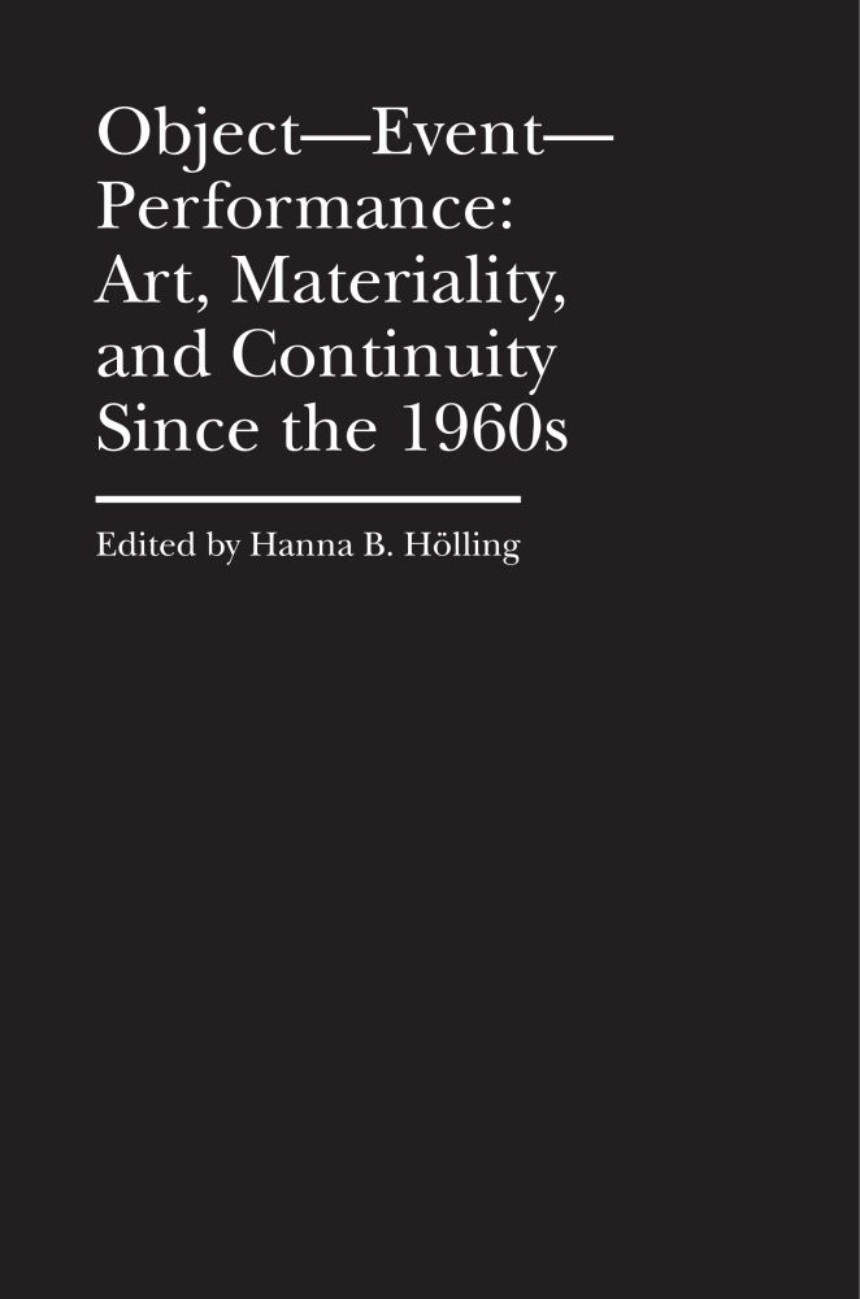9781941792223
9781941792230
Distributed for Bard Graduate Center
Object—Event— Performance
Art, Materiality, and Continuity Since the 1960s
A volume considering questions of conservation that arise with new artistic mediums and practices.
Much of the artwork that rose to prominence in the second half of the twentieth century took on novel forms—such as installation, performance, event, video, film, earthwork, and intermedia works with interactive and networked components—that pose a new set of questions about what art actually is, both physically and conceptually. For conservators, this raises an existential challenge when considering what elements of these artworks can and should be preserved.
This provocative volume revisits the traditional notions of conservation and museum collecting that developed over the centuries to suit a conception of art as static, fixed, and permanent objects. Conservators and museums increasingly struggle with issues of conservation for works created from the mid-twentieth to the twenty-first century that are unstable over time. The contributors ask what it means to conserve artworks that fundamentally address and embody the notion of change and, through this questioning, guide us to reevaluate the meaning of art, of objects, and of materiality itself. Object—Event—Performance considers a selection of post-1960s artworks that have all been chosen for their instability, changeability, performance elements, and processes that pose questions about their relationship to conservation practices. This volume will be a welcome resource on contemporary conservation for art historians, scholars of dance and theater studies, curators, and conservators.
Much of the artwork that rose to prominence in the second half of the twentieth century took on novel forms—such as installation, performance, event, video, film, earthwork, and intermedia works with interactive and networked components—that pose a new set of questions about what art actually is, both physically and conceptually. For conservators, this raises an existential challenge when considering what elements of these artworks can and should be preserved.
This provocative volume revisits the traditional notions of conservation and museum collecting that developed over the centuries to suit a conception of art as static, fixed, and permanent objects. Conservators and museums increasingly struggle with issues of conservation for works created from the mid-twentieth to the twenty-first century that are unstable over time. The contributors ask what it means to conserve artworks that fundamentally address and embody the notion of change and, through this questioning, guide us to reevaluate the meaning of art, of objects, and of materiality itself. Object—Event—Performance considers a selection of post-1960s artworks that have all been chosen for their instability, changeability, performance elements, and processes that pose questions about their relationship to conservation practices. This volume will be a welcome resource on contemporary conservation for art historians, scholars of dance and theater studies, curators, and conservators.
360 pages | 6 x 9 | © 2021
Bard Graduate Center - Cultural Histories of the Material World
Art: British Art
Reviews
Table of Contents
Senior Editor’s Preface
Acknowledgements
Introduction: Object—Event—Performance
Hanna B. Hölling
1. Introducing Fluxus with Tools
Hanna B. Higgins
2. Exhausting Conservation: Object, Event, Performance in Franz Erhard Walther’s Werkstücke
Hanna B. Hölling
3. Video Art’s Past and Present “Future Tense:” The Case of Nam June Paik’s Satellite Works
Gregory Zinman
4. Resurrecting Hannah Wilke’s Homage to a Large Red Lipstick
Andrea Gyorody
5. Mutable and Durable: The Performance Score after 1960
Alison D’Amato
6. Sometimes An Onion: Simone Forti and the Choreographic Logic of Objects and Institutions
Megan Metcalf
7. Views of Nature: Preserving Land (Art) with Collective Intent
Rebecca Uchill
8. Enlivened Pieces: Richard Tuttle at the Whitney Museum of American Art 1975
Susanne Neubauer
9. The Cheapness of Writing Paper, and Code: Materiality, Exhibiting and Audiences after New Media Art
Beryl Graham
10. The Propensity toward Openness: Bloch as Object, Event, and Performance
Johannes M. Hedinger and Hanna B. Hölling
List of Contributors
Index
Acknowledgements
Introduction: Object—Event—Performance
Hanna B. Hölling
1. Introducing Fluxus with Tools
Hanna B. Higgins
2. Exhausting Conservation: Object, Event, Performance in Franz Erhard Walther’s Werkstücke
Hanna B. Hölling
3. Video Art’s Past and Present “Future Tense:” The Case of Nam June Paik’s Satellite Works
Gregory Zinman
4. Resurrecting Hannah Wilke’s Homage to a Large Red Lipstick
Andrea Gyorody
5. Mutable and Durable: The Performance Score after 1960
Alison D’Amato
6. Sometimes An Onion: Simone Forti and the Choreographic Logic of Objects and Institutions
Megan Metcalf
7. Views of Nature: Preserving Land (Art) with Collective Intent
Rebecca Uchill
8. Enlivened Pieces: Richard Tuttle at the Whitney Museum of American Art 1975
Susanne Neubauer
9. The Cheapness of Writing Paper, and Code: Materiality, Exhibiting and Audiences after New Media Art
Beryl Graham
10. The Propensity toward Openness: Bloch as Object, Event, and Performance
Johannes M. Hedinger and Hanna B. Hölling
List of Contributors
Index

